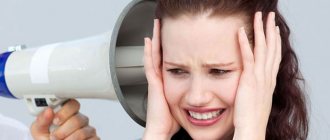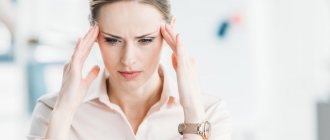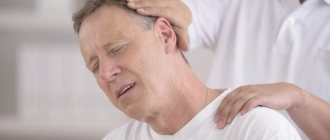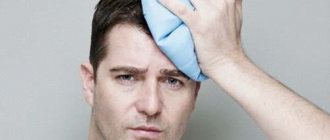Useful articles
Most people experience a pressing headache at least occasionally. According to medical statistics, up to 92% of the population is susceptible to it. Pain syndrome can develop spontaneously (for no apparent reason) or due to the influence of certain external factors. For a pressing headache, treatment depends on the reasons that caused it. If attacks occur frequently, this is a good reason to consult a doctor.
Features of the condition and symptoms
It is necessary to pay attention to the accompanying symptoms so that it is easier to identify the cause of the swelling in the head.
Pressure, swelling of the head is often accompanied by a feeling of fogginess and numbness of the limbs. All this leads to a deterioration in cognitive function and, in some cases, causes memory loss and disorientation. People with a chronic feeling of fullness are characterized by impaired concentration and decreased ability to work. They learn worse and absorb new information, and also suffer from chronic fatigue.
Common neurological symptoms are also accompanied by other signs of pathologies:
- spots before the eyes;
- cardiopalmus;
- sweating and increased fatigue;
- dizziness and nausea, leading to vomiting;
- fluctuations in blood pressure;
- increased nervousness, aggressiveness;
- sensitivity to weather changes.
If a person has the feeling that his head is about to burst, he needs to pay attention to additional symptoms, which will depend on the cause of the condition. With infectious lesions of the brain or the body as a whole, high fever, chills and muscle pain appear.
The most dangerous infection, meningitis, is accompanied by unbearable headaches and stiff neck muscles. This condition is also characterized by frequent vomiting.
With hypertension, floaters often appear before the eyes and numbness in the arms or legs.
With circulatory diseases, symptoms worsen in a horizontal position. Also, pain and a feeling of fullness appear after prolonged work with the head down. It is especially dangerous to be in stuffy, unventilated rooms.
When your head is tied with a hoop
About 80% of people have experienced a headache at least once in their life. Fortunately, the most common form is “tension headache.”
It’s as if the head is being pulled together by a “hoop” or “helmet”. The pain is dull, of moderate intensity, gradually increases and lasts from several hours to several days. May be accompanied by pain in the neck, shoulders, and back. When it lasts for a long time, it intensifies from sharp sounds and bright light.
We talked in more detail about this type of headache with Svetlana Alexandrovna Stolbova, a neurologist, higher. cat., Ph.D.
Who is most likely to experience this type of pain and why does it occur?
— Often occurs in emotional people with a high level of anxiety, with hidden depression, after suffering emotional stress, intense intellectual work, after stress. A headache develops with prolonged contraction of the muscles of the skull and neck, resulting in compression of the vessels, arteries and veins, and nerves located under the aponeurosis of the skull.
Lack of oxygen leads to the accumulation of lactic acid in the muscle, further damage to muscle fibers or their inflammation, and, accordingly, irritation of the nerve endings in the muscle and the development of headaches.
The main cause of chronic tension headaches is often a long-term stressful situation that is significant for a person. Depression is often hidden under the guise of a tension headache. In such cases, behind complaints of headache, fatigue, irritability, the actual depressive symptoms are hidden. Any long-term pain syndrome leads to a significant decrease in the quality of life and requires a comprehensive diagnostic examination.
How can you cope with tension headaches on your own?
— Tension headaches can be relieved with any painkillers, but they can only be taken for occasional headaches. If the pain recurs more than 2 weeks a month and more than 6 months a year, this is a dangerous symptom, indicating the formation of a chronic course or the addition of a vascular disease, or in case of abuse of analgesics.
BUT THE BEST TREATMENT IS PREVENTION:
- during prolonged static stress, working at a PC, take short breaks from work, do five-minute gymnastics every two to three hours;
- drink water, you need to drink at least 30 ml of water per kilogram of weight; try to maintain a daily routine, sleep at night should be at least 5 hours;
- try to eat right, exclude fast food, sandwiches, artificial energy drinks, beer, strong alcohol. Try to eat more fruits (but not in the evening) and greens, vegetable fats, lean meats, and nuts. Better - in small portions and at least 3 times a day;
- To cope with stress, the main cause of tension headaches, a change of environment, walking (at least 30 minutes a day), evening sports (15-20 minutes is enough), relaxing techniques (listen to music, take a bath) will help.
What to do during an attack?
- drink weak sweet tea
- do some light exercises
- take an analgesic
- rest or take a sedative
What should you be wary of?
- if the headache occurs after an injury (even after several years)
- the nature and intensity of the headache has changed
- the headache does not improve with the usual dose of the drug or even gets worse
- headache is accompanied by a change in body temperature (increase or decrease)
- headache accompanied by nausea and vomiting
- headache worsens with coughing, sneezing, straining
- headache is accompanied by impaired visual acuity, double vision or changes in visual fields
- Fainting, lightheadedness, or convulsions occur due to headache
If you decide to see a doctor, what can help make a more accurate diagnosis?
- keep a “headache diary” for at least a few days, note the nature of the pain, intensity (in points from 1 to 10), time of occurrence, provoking factor, which reduces and intensifies the headache;
- keep a “blood pressure diary”, measure blood pressure and pulse in the morning, immediately after waking up, and in the evening, around 19.00-21.00;
- write a list of the medications you took, taking into account the duration, frequency of use and the number of tablets at one time;
- If you have undergone a preventive examination at a medical institution within a year, please bring copies of the results (general blood count, blood glucose, electrocardiogram, general urinalysis). The following can help in diagnosis: radiography of the cervical spine and any vascular examination (rheoencephalography, ultrasound examination of brachiocephalic vessels), consultation with an ophthalmologist (examination and detailed description of the fundus picture).
How can you identify the true cause of a headache?
Our clinic has developed a special program “Down with the Headache”, which is aimed at diagnosing and identifying the causes of headaches. The program includes an ultrasound of the brain vessels, a number of necessary tests, as well as a consultation with a neurologist. The cost of the program is 3,999 rubles.
We wish you good health!
Stolbova Svetlana Aleksandrovna, neurologist, reflexologist, higher education.
cat., Ph.D. Return to list
Non-pathological causes of distension
Both illnesses and features of a person’s life can cause feelings of fullness in the head. Unfortunately, it is almost impossible to control them all.
- Constant stress. Residents of megacities are more susceptible to them, even during simple work that does not involve emotional and mental stress. Stress can be triggered by intense experiences, shocks and tragedies.
- Junk food and drinks. Fatty dishes, spicy, salty combined with alcohol, and even flavored with smoking. All this has an extremely negative effect on blood vessels. Improper nutrition provokes atherosclerosis, which can lead to strokes and heart attacks.
- Abrupt climate change. Weather dependence can cause severe discomfort. Such sensations can only be controlled by taking special medications.
- Use of medications. Various dietary supplements can cause discomfort. Some medications, such as antidepressants, sleeping pills, anticonvulsants and painkillers, also have similar side effects.
- Lack of sleep and rest. If a person constantly sleeps for 4-6 hours, sooner or later he will encounter unpleasant neurological disorders. They can also be provoked by incorrectly selected accessories - mattress, pillow.
- Fasting and dangerous diets. Many women follow aggressive nutrition programs, causing enormous harm to the body. It is not recommended to do this without medical supervision.
- Overexertion and heavy physical labor. Intense sports and exercise for the purpose of losing weight can affect the condition of blood vessels and the nervous system. It is not recommended to lose more than 1 kg per week.
If the symptoms accompanying the feeling of fullness in the head occur regardless of adjustments in diet and rest regimen, the person will need a comprehensive diagnosis. After all, the reason may be hidden in pathological disorders.
Pathological factors
Among the diseases and disorders that cause bursting pain in the head are:
- VSD. Vegetative-vascular dystonia is a set of symptoms that arise from changes in the functioning of the nervous system.
- High intracranial pressure. It becomes a consequence of tumors, cysts, and hormonal disorders. It also develops in response to congenital changes and the use of certain groups of medications.
- Infections. Brain infections are especially dangerous. But other diseases can also be diagnosed. For example, with tuberculosis.
- Benign and malignant neoplasms. They provoke a feeling of swelling of the brain tumor, as well as the organs of the neck. The pain is unbearable, causing a wide range of symptoms over time.
- Diseases of the hormonal system. High progesterone, changes in estrogen levels, and fluctuations in other hormones.
- Meniere's disease. A disorder of the vestibular system that is practically untreatable.
- Pathologies of the thyroid gland. A deficiency or excess of organ hormones can provoke unfavorable symptoms.
Often, a feeling of squeezing in the head appears after injuries to the skull or concussions.
Patient examination methods
If you have a constant headache, you need to do an MRI.
To identify the reasons why your head seems to be bursting from the inside, you need to turn to instrumental techniques:
- do a CT scan to detect cysts, tumors and changes in the brain;
- perform an ultrasound to analyze blood vessels;
- undergo an MRI if circulatory pathologies and tumors are suspected;
- take an x-ray if there are changes in cartilage and bones;
- sign up for electromyography to study the state of neurons and the muscular system.
Patients are also prescribed blood and urine tests. They are necessary to assess inflammatory reactions and hormone levels.
After diagnosis, the doctor evaluates the results. Based on them, an accurate diagnosis can be made for further therapy.
Diagnostics
Patients who experience heaviness in the head require consultation with a neurologist. The specialist receives valuable information during the initial examination, determining the neurological status and conducting simple tests to assess autonomic innervation. During a conversation with the patient, the fact of dependence on alcohol or psychoactive substances can be revealed. Diagnosis of the causes of heaviness in the head involves the appointment of instrumental and laboratory methods, of which the most commonly used are:
- CNS study.
Standard examination in neurology includes echoEG, which is used to measure intracranial pressure and identify space-occupying pathological formations. To clarify the diagnosis, EEG, CT, and MRI of the brain are prescribed. REG and extracranial ultrasound data have diagnostic value. - X-ray of the spine.
Images of the cervical spine in two projections make it possible to determine bone deformation, narrowing of joint spaces, and developmental anomalies. Bones and neurovascular bundles are visualized in detail during either MRI. - ENT examination.
Heaviness in the head accompanied by dizziness requires a standard otoscopy and a hearing test using audiometry. For diagnostic purposes, specific tests are performed: acoustic impedance measurement, electrocochleography, vestibulometry. - ECG.
Unpleasant symptoms may be associated with cardiac problems, for rapid diagnosis of which electrocardiography is recommended. If abnormalities are detected on the cardiogram, the diagnosis is clarified using 24-hour blood pressure monitoring and echocardiography. - Blood analysis.
When heaviness in the head is combined with an increase in body temperature, it is necessary to examine the hemogram. The results of the analysis indicate an inflammatory process (leukocytosis and increased ESR), and also help diagnose polycythemia (with an increase in the number of red blood cells).
Massage of the cervical-collar area
Treatment methods
Herbal compresses will alleviate the condition.
To treat a bursting feeling in the head, it is important to establish the cause of the disorder. Next, treatment tactics are prescribed. General recommendations to reduce pain are required:
- You should not take medications without a doctor’s examination;
- You can relieve tension by taking a comfortable position and relaxing;
- a towel soaked in cool water will help with feeling unwell;
- you should open a window or window so that it is not stuffy;
- if there is no nausea, you can drink warm tea.
When it becomes easier, you should not immediately start heavy work or exercise.
Folk recipes
During treatment, you can use decoctions of chamomile, mint, and St. John's wort, but only after discussion with your doctor. You also take 40 drops of propolis tincture and add honey to your drinks. Cosmetic clay compresses applied to the forehead before bed will also help combat discomfort.
Medicines
Prescription of medications depends on the cause of the condition. Sometimes taking an NSAID is enough to relieve pain. But in most cases an integrated approach is required. They use medications to improve blood circulation, take analgesics and vitamins in courses.
When using medications, it is important to follow the instructions and not ignore contraindications.
Preventive actions
Physical activity and a healthy diet are the main protectors of the body.
To prevent unwanted symptoms and diseases associated with them, it is necessary:
- sleep and work in a ventilated area;
- regularly walk in parks, visit the forest if possible;
- engage in physical exercise without excessive stress, but do not give up sports completely;
- attend professional head and neck massage courses, as well as master self-massage techniques;
- sleep at least 8 hours a day;
- take natural sedatives if you are prone to anxiety and stress;
- stop smoking and frequent drinking of alcoholic beverages, normalize your diet.
Preventive measures must be taken constantly, not only when unwanted symptoms appear. It is recommended to take vitamin courses every year and monitor your blood pressure levels.
Prevention
Often, after quick relief or after the unpleasant sensations in the head subside on their own, a person calms down and does not take any measures to prevent a repeat attack. At the same time, a radical revision of your entire lifestyle is the most important step towards good health.
Therapeutic measures to eliminate heaviness in the head must necessarily be supplemented by normalizing the work and rest regime. The duration of sleep should be limited to 8 hours, and time for physical activity should be included in the daily routine. It is necessary to spend more time in the fresh air and, if possible, give up bad habits.
Only such an integrated approach to solving the problem will help you get rid of the heaviness in your head and maintain the clarity of consciousness and thinking necessary for a full life.
Sign up at the MART medical center in St. Petersburg (see map) by calling 8 or leave a request on the website.








